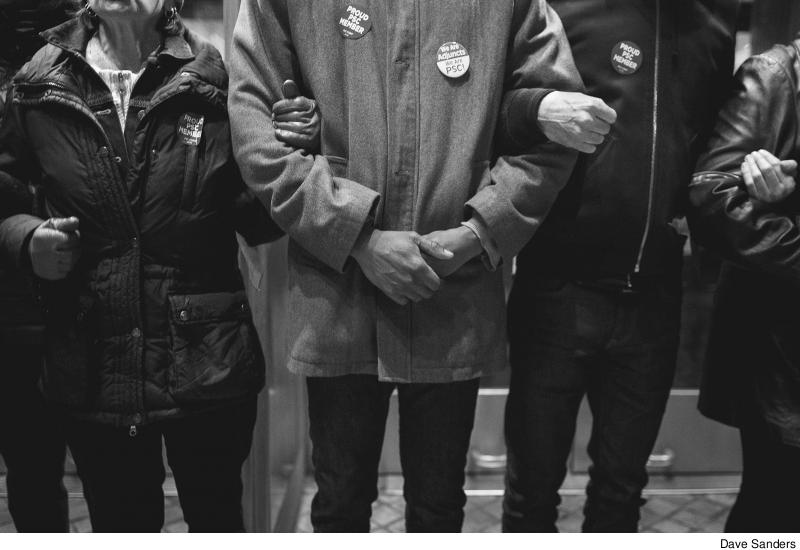
For the last year, PSC members have waged a campaign for a fair contract and full funding for CUNY, using a variety of tactics. We look back on the campaign, as the union prepares for more escalation. Above, members blocked the entrance to Baruch College during a Board of Trustees meeting on December 10.
The Democrats now control both houses of the state legislature. The PSC is organizing to advance its agenda in the new Albany landscape.
Faculty and students say ongoing construction at a Baruch building is harming teaching
PSC members are working creatively, both locally and throughout the country, to stand with immigrants against a xenophobic White House.
It wasn’t a shock in late December that Governor Andrew Cuomo once again vetoed a bipartisan-supported “maintenance of effort” bill for public higher education, a bill that would have included funds for CUNY and SUNY to cover the inflationary increases in operating costs at the four-year colleges, such as rent, utilities and contractual salary increases.
But for CUNY, the real pain came in early January, when the CUNY Board of Trustees made its official budget request to the city and state, one that the PSC said was based on the expectation of another tuition increase at the four-year colleges. While the request called for an increase in the funds for fringe benefit costs, it did not include a specific dollar-amount needed to fund the next contract and did not address increasing adjunct pay as a part of that contract. The message this sends to the union is that raises will have to come out of colleges’ existing budgets (especially true for senior colleges, which are funded by the state, unlike the two-year campuses, which are largely funded by the city). The implication is that campuses will have to make cuts before faculty and staff can get their raises.
The union blasted the CUNY Board of Trustees, as retirees testified that inaccurate pension calculations mean they aren’t receiving full retirement benefits.
For the last year, PSC members have waged a campaign for a fair contract and full funding for CUNY, using a variety of tactics. We look back on the campaign, as the union prepares for more escalation. Above, members blocked the entrance to Baruch College during a Board of Trustees meeting on December 10.
The Democrats now control both houses of the state legislature. The PSC is organizing to advance its agenda in the new Albany landscape.
Faculty and students say ongoing construction at a Baruch building is harming teaching
PSC members are working creatively, both locally and throughout the country, to stand with immigrants against a xenophobic White House.
It wasn’t a shock in late December that Governor Andrew Cuomo once again vetoed a bipartisan-supported “maintenance of effort” bill for public higher education, a bill that would have included funds for CUNY and SUNY to cover the inflationary increases in operating costs at the four-year colleges, such as rent, utilities and contractual salary increases.
But for CUNY, the real pain came in early January, when the CUNY Board of Trustees made its official budget request to the city and state, one that the PSC said was based on the expectation of another tuition increase at the four-year colleges. While the request called for an increase in the funds for fringe benefit costs, it did not include a specific dollar-amount needed to fund the next contract and did not address increasing adjunct pay as a part of that contract. The message this sends to the union is that raises will have to come out of colleges’ existing budgets (especially true for senior colleges, which are funded by the state, unlike the two-year campuses, which are largely funded by the city). The implication is that campuses will have to make cuts before faculty and staff can get their raises.
The union blasted the CUNY Board of Trustees, as retirees testified that inaccurate pension calculations mean they aren’t receiving full retirement benefits.


